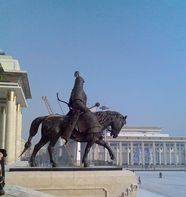Political Structure of Mongol Empire
 Genghis Khan had supreme power and established the posts of prime minister, state judge, shaman, minister, marshal and “darkhan”. Title holders were not only pardoned for their first nine offences but were also exempt from any taxation. Genghis also created the councils of sages and Ikh Khuraldai (general assembly) to make final decisions on state-related issues. Any outstanding issues were discussed by the council of sages which made relevant recommendations. The General Assembly discussed and took decisions on the most essential matters of war and peace. The unified Mongol state’ s basic law was a code of laws called “Ikh Zasag”. The law codified matters such as throne inheritance, relationships with foreign countries, general assemblies, rights of commoners, military force, hunting, finance, taxation, criminal and civil laws, and family law.
Genghis Khan had supreme power and established the posts of prime minister, state judge, shaman, minister, marshal and “darkhan”. Title holders were not only pardoned for their first nine offences but were also exempt from any taxation. Genghis also created the councils of sages and Ikh Khuraldai (general assembly) to make final decisions on state-related issues. Any outstanding issues were discussed by the council of sages which made relevant recommendations. The General Assembly discussed and took decisions on the most essential matters of war and peace. The unified Mongol state’ s basic law was a code of laws called “Ikh Zasag”. The law codified matters such as throne inheritance, relationships with foreign countries, general assemblies, rights of commoners, military force, hunting, finance, taxation, criminal and civil laws, and family law.
 In 1204, Genghis Khan introduced a written script for the Mongolian language. He attached much importance to its knowledge and employed many scholars, sages and officials as his advisors. Tatatunga, an official from the Naiman tribe and Yelyui Chutsai, a Kidan scholar both served at Genghis Khan’s court. Genghis Khan was an extraordinarily gifted person of high intellect and intuition, an outstanding statesman and political figure of his time, a military genius surpassing all his predecessors and one of the world/s greatest commanders.
In 1204, Genghis Khan introduced a written script for the Mongolian language. He attached much importance to its knowledge and employed many scholars, sages and officials as his advisors. Tatatunga, an official from the Naiman tribe and Yelyui Chutsai, a Kidan scholar both served at Genghis Khan’s court. Genghis Khan was an extraordinarily gifted person of high intellect and intuition, an outstanding statesman and political figure of his time, a military genius surpassing all his predecessors and one of the world/s greatest commanders.
The principles and rules given by him to the princes began to spread, becoming the customs and statesmanship heritage of the whole Mongolian nation. Genghis Khan worshipped the Eternal Blue Skies and shamanism since childhood. He taught his sons to cherish and esteem the Father Sky and Mother Earth. Genghis Khan issued edicts ensuring the right to practice other religions and preventing religious intolerance and hostilities. He instructed his soldiers and officers to avoid destroying occupied countries’ churches and temples, and carried out policies with respect to religious persons, exempting them from taxation and military service.












